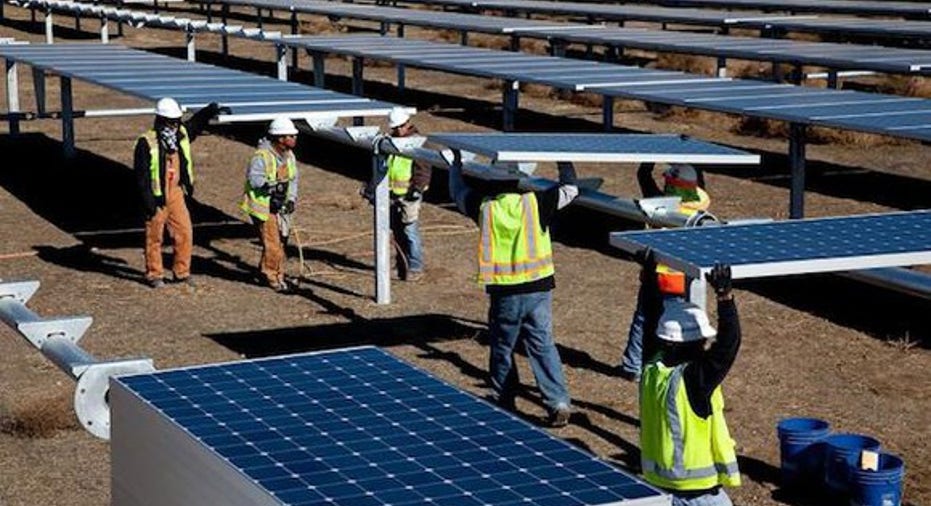Why Warren Buffett Wants Keep Solar Panels Off Your Roof and Own Them Himself

Warren Buffett's utility has blocked rooftop solar for customers in Nevada because NV Energy can buy it cheaper itself. Image source: SunPower.
No company has fought rooftop solar harder than Nevada's NV Energy, the utility owned by billionaire Warren Buffett's Berkshire Hathaway (NYSE: BRK-A)(NYSE: BRK-B). Late last year, the utility pushed through rules that would pay rooftop solar customers the wholesale rate for electricity they export to the grid instead of the retail rate. That's like getting a 75% cut on what you're getting paid for electricity you send to the grid, something no other utility has done in the U.S.
Part of the reason that Buffett's NV Energy is against rooftop solar is because it can buy solar energy for less than consumers can put it on their roof. And a recent deal with Techren Solar LLC to buy electricity for 4 cents per kWh, about a third of what customers pay for electricity, is a big argument in Buffet's favor. This demonstrates the complicated relationship Buffett and utilities have with solar.
Large scale projects are the cheapest way to install solar energy. Image source: SunPower.
Independence vs serving everyone
Utility scale solar is not necessarily cheaper on a per kWh basis than rooftop solar. Scale lowers costs, and there's simply no way rooftop solar could compete in the wholesale market on cost alone -- but that's a simplistic way at looking at the industry.
The debate about rooftop solar should include the benefits resources distributed throughout the grid have for the grid itself. Rooftop solar can help lower distribution, transmission, and peak plant costs for everyone on the grid, even if it's really hard to put a dollar value on that benefit.
The other thing to think about is independence. Why should it matter if Warren Buffett can buy energy for 4 cents per kWh when he's still selling it to customers for 12 cents per kWh? Why shouldn't a customer be able to build their own solar system to offset their own cost and profit themselves? Scale is great if it benefits everyone, but what if my individual benefit is highest by generating my own electricity?
The argument for community solar
In many ways, this dynamic is the argument for community solar. Customers get the cost benefit of building solar power plants at scale while still getting solar energy as individuals. The distributed benefits are reduced, but on a strict cost per kWh basis, it is less expensive than solar panels on your roof.
One question about community solar is the role of the utility. Does a utility own the system and make a profit from it? Is it an intermediary taking a cut of the revenue? Right now, the rules are set state by state, and that has limited the growth of community solar so far.
How Warren Buffett is both right and wrong in solar energy
Depending on how you look at it, NV Energy's desire to buy utility solar on the cheap so all customers can benefit is either good or bad. More utility scale solar will indeed help all ratepayers, not just the homeowners who can currently install solar today.
But should the utility really be making it harder for customers to generate their own electricity, especially in a sunny state like Nevada? That's a hard sell in a capitalist society that should be giving choice to consumers concerning their energy consumption.
NV Energy is buying more solar energy all the time, but rooftop solar installers are still shut out of the rooftop solar market, and that could be the case for a long time to come.
A secret billion-dollar stock opportunity The world's biggest tech company forgot to show you something, but a few Wall Street analysts and the Fool didn't miss a beat: There's a small company that's powering their brand-new gadgets and the coming revolution in technology. And we think its stock price has nearly unlimited room to run for early in-the-know investors! To be one of them, just click here.
Travis Hoium owns shares of Berkshire Hathaway (B shares). The Motley Fool owns shares of and recommends Berkshire Hathaway (B shares). Try any of our Foolish newsletter services free for 30 days. We Fools may not all hold the same opinions, but we all believe that considering a diverse range of insights makes us better investors. The Motley Fool has a disclosure policy.



















